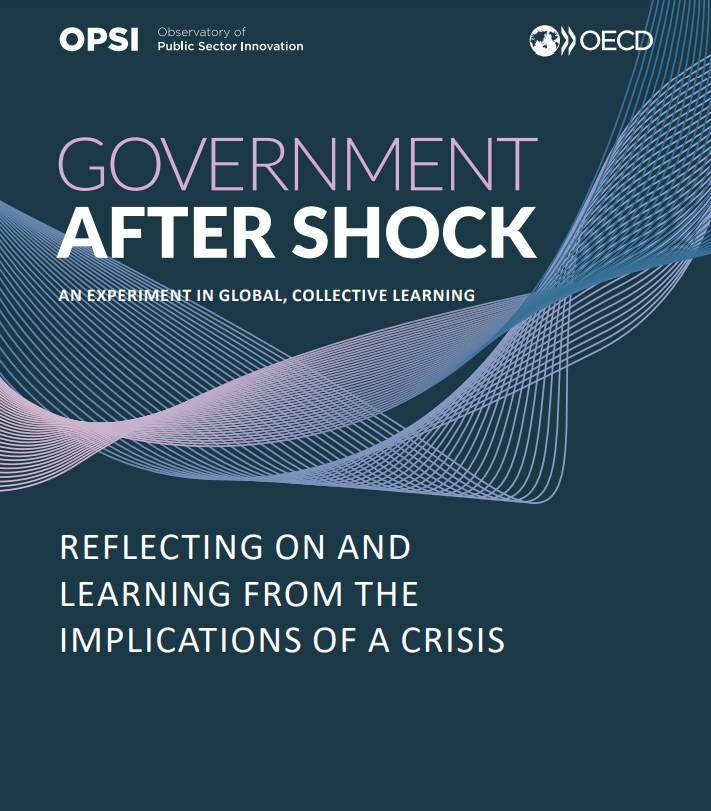Government After Shock: An experiment in global, collective learning

Overview
Government After Shock was an opportunity for collective learning; to think critically about the implications of the COVID-19 crisis, and to explore how to steer government and society towards preferred futures rather than reverting to the status quo. The Government After Shock event was co-designed to bring local and global relevance to this conversation on the future of government and society. The event convened over 5500 citizens, practitioners, stakeholders, and government leaders in over 65 local and thematic conversations. This was followed by a global forum with government leaders and practitioners to discuss the global implications of crisis, and to explore a path forward as we emerge from the crisis. The goal: to reflect on, and learn from, the hard-won lessons of 2020 and steer towards better futures rather than reverting to the old “normal.”
This crisis has forced every member of society to adapt their lives in the face of circumstances outside of their control. It has demonstrated the ability of government to move and act quickly and has shown how government and society can come together in the face of a crisis. It has also brought the world to a critical juncture; showing the complexity of the challenges that are facing us at a global scale – challenges which require immediate action from government and society. It has acted as a call to action for governments; highlighting the need to revisit how we “do” government, and demonstrating that the policies, practices and institutions of government are not currently suited for the uncertain and complex futures that await.
The enthusiastic participation in Government After Shock of stakeholders around the world illustrated that people truly do care and see this moment in time as a turning point for government and for society. The insights gathered at this event will feed into a Call to Action for governments; pushing for change and transformation based on the lessons learned from this crisis.
In the face of crisis, governments can work efficiently and move beyond the status quo
Governments can innovate, be agile, adapt, act quickly, adopt new technologies, work remotely, collaborate across silos, and move beyond rigid hierarchies. How can this way of working be maintained, sustained and supported beyond crisis situations?
Governments must embrace and explore uncertainty in the face of complex futures
This crisis has highlighted the need for new approaches in the face of uncertainty and complex futures. Governments need to use methods that support experimentation, allow for failure, promote continuous learning and openly explore uncertainty. How can governments take a more anticipatory approach?
Effective communication and inclusive participation build trust in times of crisis
Clear, inclusive communication, coupled with active listening, engagement and participation is more important now than ever. Trust between government and society needs to be built over time and sustained and strengthened through times of crisis. How can governments continue to engage more openly with people and involve citizens in decision-making?
Rapid digital transformation and increased data governance have positive potential when the ‘human’ is at the centre
Governments and society have “digitised” at an unprecedented rate: this has been a largely positive development but needs to be tempered with an emphasis on the human elements, such as inclusion, respect of privacy concerns, ethical use of data and social connection. How can government be both digital and centre the ‘human’ elements of government?
Complex problems require increased collaboration across sectors, governments and country boundaries
he crisis has united the public, private and civil society sectors, as well as all levels of government around common challenges. It has demonstrated the need for continued cross-sectoral, intergovernmental and intragovernmental collaboration, and has shown the essential role these actors play in the modern policy context. How can this be sustained when the common goal is not as urgent, immediate and obvious as during a crisis?
Governments must place citizens and inclusion at the centre of policy making as the needs of society evolve rapidly
Policy gaps and shifts in the needs and desires of citizens have emerged throughout this year: government needs to invest more in inclusive and sustainable economies, infrastructure and societies and recognise that the priorities of citizens have changed. How can governments ensure that there is a focus on overall well-being instead of goals that should be subordinate: economic growth and efficiency?

Government After Shock: An experiment in global, collective learning
Published on 11 January 2021.
